- Home
- Peter Lerangis
Enter the Core Page 3
Enter the Core Read online
Page 3
“My kind of guy.” Mario took a right-hand exit and zoomed toward a knot of cars lined up at a red light at the end of the ramp. “Who-o-o-oa . . . hang on . . .”
He stomped on the brakes. The car began to fishtail. The back of a Range Rover loomed closer. Max closed his eyes as the car squealed to a stop.
When he opened them again, a shocked, angry Yorkie was yapping at them through the back window of the Range Rover.
“My bad,” Mario said. “Guess it must be a big day at Bilgewater.”
“Is it always this crowded?” Max asked.
Mario shrugged. “Dunno. Honestly, most of my customers don’t come here.”
Yap! Yap! Yap-yap-yap-yap-yap-yap-yap! yapped the Yorkie.
“My thoughts exactly,” Alex said.
Max peered through the window at the road to the right. He could see distant flashing red lights. The traffic was bumper-to-bumper all the way to a big tan-brick building about a quarter mile away. “That’s the prison,” he said. “And it looks like some kind of police action is blocking the traffic.”
“No worries,” Mario said, looking over his shoulder. “I’ll put it in reverse, climb the grassy hill, get back on the highway, take the next exit, and cut through the—”
“No!” Max and Alex cried out together. Before Mario could protest, they unhooked their belts and bolted out of the car.
A dirt path followed along the road, with cement patches that hinted of a former sidewalk. People stared through the windows of small houses, and a homeless woman with a wool cap and a bandaged face staggered toward them, holding a bottle and an empty cup. “Change? Spare some change?” she shouted in a guttural voice, lurching into Max’s path.
Trying to avoid her, Max jogged from side to side, but the old woman mirrored him. As they slammed into each other, the woman wrapped him in a kind of bear hug. “Shall we dance, old boy?” she said.
Max caught a whiff of fish. “Sorry!” he said, bouncing away
With a grumble, the woman turned her back and staggered up the road as if nothing had happened.
“Come on, Max!” Alex shouted, pulling Max toward the commotion. They elbowed their way through a crowd of people who’d left their cars to stare.
Max had no idea what they were staring at.
They stopped at the line of cars outside the prison. A man and two women with video equipment marked WBGT-TV were just inside the gate. One of the reporters was talking into a mic with a serious look. “Police are examining leads,” he said in an announcerish voice, “and the mayor has urged all in the neighborhood to stay inside houses and report any suspicious-looking people. More news at six.”
“What happened?” Alex demanded to the closest cop.
“The prison is in lockdown,” the cop replied.
“Why?” Alex asked.
“There was an escape,” said someone in the crowd.
People began speaking all at once:
“Dug a tunnel with his fingers . . .”
“Bit a guard in the neck . . .”
“A convicted mass murderer . . .”
“Snuck out in a pile of laundry . . .”
Alex looked helplessly at Max. He pulled out his phone and began accessing the social media feed of WBGT. Clicking through a post that said BREAKING NEWS, he read carefully.
“It was an escape. . . .” he murmured, then read aloud, “‘The breakout method has not been disclosed, and officials have not released any names, but he is believed to be a white male, age fifty to fifty-five. He is assumed dangerous, and local residents are encouraged to call 911 with any leads.’”
Alex ran toward a group of officials gathering by the TV interviewer, but a policeman stood in her way.
“We have an appointment!” Alex cried out.
“Sorry, not today,” he said.
“The person who escaped—do you know anything about him?” Alex asked.
The policeman shook his head. “They have to search the prisoners to be sure.”
“How are the residents going to know who to look for?” Max asked.
Not far from him in the crowd, a thin, white-haired woman spoke up: “This has happened before, honey. All of us in the neighborhood look out for one another. We recognize unfamiliar faces. These cons always try to disguise themselves. Last year, one of them wore clothes he found in a dumpster.”
“The rotten zucchini stuck to the back of his shirt gave him away,” said the man standing next to her, erupting with a big laugh. “Then there was the guy who pretended not to know English. He was wearing a T-shirt and Mickey Mouse undershorts. Like the residents in a prison town wouldn’t suspect he ditched his uniform for that getup! Hoo boy, you see every kind of crazy disguise here.”
Max began smelling fish again. And he thought back to the old woman he’d collided with.
Shall we dance, old boy?
By now Alex was moving on, talking to more people, trying to get the attention of the officials. Alex and Max looked back up the road from where they’d just come. Littering the cracked walkway was a crumpled-up dollar bill and three Skor bar wrappers.
He shoved his hands into his pocket to get his phone. “Alex!”
She elbowed her way back through the crowd. “What happened?”
“I smelled fish. I only smell fish when I feel afraid. And I only feel afraid when something is very, very wrong.” Max pulled his hands from his pockets. “My wallet . . . my money . . . they’re gone . . .”
“The homeless woman robbed you?” Alex asked.
“That homeless woman,” Max said, “was Spencer Niemand.”
5
APPROXIMATELY twenty-nine miles northwest of Bilgewater State Penitentiary was a colony of brick buildings arranged neatly among luscious green lawns. In the Brick Hollow Residences for the Well-Lived, white-haired men and women sat on porches, watching the arcs of hissing sprinklers. Orderlies in crisp white coats pushed residents in wheelchairs along curved paths. In a place where people went to finish out their lives, no one was in much of a hurry, and the loudest voices belonged to the birds.
Which made the speed and the noise of the long black car unusual, as it peeled into the entrance driveway.
Inside the entrance, a woman wearing a pin-striped suit and a scowl glanced out the window. “I believe your visitors are here, sir!” she announced sharply. “Martin? Did you hear me?”
In a cozy waiting area warmed by a gas-powered fireplace, an ancient man opened his eyes. His head was as smooth as polished pearl, his movements slow. As he turned to the window, the thick lines of his face suggested a feral animal staring through granite crags. “Thank you, Ms. Hughes,” he rasped.
These “visitors” had called only a few hours earlier, with an offer of money too high to believe. The amount would more than take care of his ailing wife; his children, who had taken over the family business; and his grandchildren and great-grandchildren. For this, all he needed to do was turn over the papers of his own grandfather. He recalled a fight over them, between Grandpapa and Uncle Oliver. The contents were valuable, but he no longer remembered why.
So much was lost to memory these days.
He fingered the keys to his storage room, then dropped them into his pocket. First, he would talk to these people. His gut instincts would take care of the rest.
Two figures exited the car, one small and lively, the other tall and powerful-looking. Both wore stylish black coats and black wide-brimmed caps, and they seemed to be in a great hurry. The old man hadn’t had visitors in such a long time, and he felt a flicker of excitement. Could they be long-lost nieces and nephews? Grandchildren of dear old friends?
He grabbed the handles of his walker and stood. Slowly he shuffled toward the front door, where Ms. Hughes was greeting the two strangers.
They came straight for the old man. His eyesight was nearly gone, but there was something familiar about the taller one’s posture and the tilt of his head.
Briefly, as if out of polite habit, the t
all man removed his hat. He seemed to think twice about this and placed it immediately back upon his head. But even with diminished vision, in that brief moment the old man could see a full head of jet-black hair—and the path of white down the center, like the Milky Way. He recognized the strange visitor.
It’s Uncle Oliver.
Oliver Niemand.
The old man felt the breath catch in his throat. It couldn’t be. Oliver was long gone. This had to be a son. Even a grandson.
“Hetzel,” the visitor said.
Dear Lord, even the voice was the same. A Niemand voice.
“Mr. Hetzel?” came Ms. Hughes’s voice. “Are you all right?”
Before the old man could reply, his grip weakened. He felt himself slip, slip, slipping to the carpet.
6
ALEX was the first Canadian Max had ever met. The second was her friend Rod Rosas, who had bolted toilet seats to his college dorm room wall. Inside each was a photo of a smiling face.
“The red-haired dude in the pink-padded seat—in the left eye,” he said, leaning back in a black wooden chair emblazoned with a Harvard crest.
He flung a plastic dart toward the image of a man pasted to the wall inside a pink toilet seat. The dart embedded itself in the man’s right cheek.
“You missed,” Alex said. “He’s laughing at you.”
“He’s my physics professor, he doesn’t know how to laugh,” Rod said.
“This is not helping us!” Max paced the floor, kicking aside a sweatshirt. The floor was piled with papers, gadgets, empty plastic cups, clothing that was already collecting dust, and a few half-eaten candy bars still in their wrappers. “You said Rod was the smartest guy in your high school. You said he could help us figure out where Stinky went. All he does is play darts.”
“Stinky” was the nickname given to Spencer Niemand by his submarine pilot, jolly old Basile Grimsby. He had sacrificed himself to save Max’s and Alex’s lives, and Max liked to keep his memory alive.
“Throwing darts helps me think,” Rod said, as one of his tosses thudded against a toilet seat and clattered to the ground. “I’m still processing that Jules Verne was your great-great-great-grandfather. And the idea that those awesome novels weren’t fiction.”
“Totally real,” Max said. “Verne was trapped in a submarine with an evil captain just like in Twenty Thousand Leagues Under the Sea. At the end of that voyage, he hid the treasure. Same with Around the World in 80 Days—he went around the globe finding five secret ingredients for a formula.”
“We met Bitsy in London, at Basile’s funeral,” Alex said. “She helped us find another clue, and then she traveled all over the world with us—Greece, Siberia, Nepal, Mexico, Antarctica. We trusted her, and she robbed us.”
“Her stepmom, who’s in prison in Ohio, says Bitsy might have taken the stuff to her dad, Spencer Niemand, who’s in prison in Massachusetts,” Max said.
“What an accomplished family.” Rod threw another dart, but it thwacked into the door. “Niemand Enterprises has a plant in Waltham, I think. One of my MIT friends interned there. They develop some cool high-tech materials. Like a superadhesive glue that changes the biochemistry of the skin when you touch it. A thin filament that can lift a granite boulder. A targeted explosive that shoots from a ring without injuring the wearer. Mostly military, not authorized for commercial use, top secret to everyone except employees. And maybe some VIPs.”
Rod raised an eyebrow, and Max knew just what he meant. “So if, like, the daughter of the founder paid a visit,” Max said, “she might be able to sneak out something illegal. Something that could do damage to a prison cell!”
“You are a genius!” Alex added.
Max smiled. “A lot of people say that.”
“I meant Rod, not you,” Alex shot back.
“Middle toilet, SpongeBob, in his bow tie!” Rod said, finally landing a dart exactly where he said he would. “So where did father and daughter go?”
“We have no clue,” Max said. “Maybe they went someplace to mass manufacture it. Maybe they think they’ll get rich selling a secret cure.”
“Gloria Bentham—Niemand’s ex-wife—thinks he has some plan based on one of Verne’s other books,” Alex said.
“Seems far-fetched to me,” Rod replied, turning away from the toilet seats, “unless one of Verne’s books was called Making Twenty Thousand Gallons of Miracle Serum in Eighty Minutes!”
Max shrugged. “Anything’s possible. We found the first treasure clue in my attic. Then we found other clues in the places we went to, like a scavenger hunt that traced the route of Twenty Thousand Leagues. At the end of it all, we found another clue at the bottom of the treasure. That one led us to a discovery inspired by Around the World.”
“OK, but even if it were hypothetically true—even if Niemand is like, bwa-ha-ha, now I shall follow Jules Verne’s plans for the miracle serum instead of doing the only thing that matters to me, which is making a fortune—what book would it be?” Rod asked.
“Good question,” Alex said.
“Are you sure you found everything Verne hid in the attic?” Rod threw another dart. This one flew into the oval of a dark wooden toilet at the bottom right. “At the start, you guys ran out of there to find the treasure. Then you got caught up in the second search, saving your mom’s life. Everything’s been hurry, hurry, hurry. You might be missing something.”
Max moved closer to the target. The dart had landed between the eyes of an old black-and-white photo of . . . Jules Verne!
“That wasn’t nice,” Alex said.
Rod giggled. “I was wondering when you guys would notice him.”
Max couldn’t look away from the photo. Verne was doing it again, staring at him. Staring into him. Beckoning Max with his hundred-fifty-year-old eyes. Max moved closer. Verne seemed to be on the verge of telling a joke. His face had youth and mischief. It was a totally different person than the boring, serious-looking guy he and Alex had found in the . . .
“The oil painting!” Max blurted out.
Alex stared at him blankly.
“Excuse me?” Rod said.
“There’s a portrait of Jules Verne on our living room wall,” Max replied. “Alex and I found it in the attic. It’s signed by the artist. Verne’s biography has the same painting on the cover, but the signature isn’t there.”
“Um, maybe it’s not actually the same painting?” Rod said.
“It is,” Alex said. “One of my aunt’s friends figured ours was a copy of the original, and a collector put his name on it.”
Rod scrunched up his brow. “Really? That’s like vandalizing it. Why would a collector do that?”
It was a good question. And it got Max’s mind racing.
“Unless it wasn’t a collector!” he blurted out.
He pulled out his phone and navigated quickly to the photo of the painting. Zooming in with his thumb and forefinger, he showed Rod the signature:
LEVI HEK
AZZA
“Levi Hek Azza . . .” Rod pulled out his own phone and did a search. “Nada. Not in Wikipedia. Not anywhere.”
“If he existed in the nineteenth century, there would be something about him,” Alex said.
“Unless,” Max piped up, “Levi Hek Azza isn’t a real person.”
“I don’t see where you’re going with this,” Rod said.
“The painting was in the attic, near the chest where we found the first note,” Max said. “So maybe Rod was right. We didn’t look hard enough. This one was staring us right in the face. It’s got to be a code. Verne loved codes.”
“Gotta be an anagram!” Rod accessed a site on his phone and tapped in the name.
Max looked over his shoulder at the results:
No anagrams found.
“Whoa, so much for that idea,” Rod murmured. “It’s rare you find nothing.”
“Verne liked to do substitution codes,” Alex said. “You know, each letter is really a different one, like maybe . . . it�
��s really the second letter after it, something like that.”
“Or each vowel is the vowel before it, and each consonant is the one three consonants to the left,” Max said.
“My head is spinning,” Rod replied.
Max stared at the screen. “OK, let’s think. Break it down. Verne always provided some way into the solution.”
“Some kind of key?” Rod asked.
“Right. If you’re supposed to go three letters to the left, he’d include a minus three, for example,” Alex said. “One time he gave us the shape of a wheel. You had to put letters at each end of the spokes and substitute one for the other.”
“But this is just a name!” Rod said. “No numbers, no wheels.”
“True,” Alex agreed.
“No,” Max said. “Not true! False. Look at the way the name is arranged. The first name and middle name at the top—Levi Hek. The last name at the bottom—Azza. Why?”
Alex looked at Rod. They both shrugged.
“Azza is separate. Maybe it’s our key? Just winging it here,” Alex said.
“Bingo,” Max replied. “A and Z are the first and last letters of the alphabet. You can look at Azza as AZ followed by ZA. So maybe that’s a key. Verne is telling us to go from A to Z, and Z to A.”
“So you substitute letters in a backward alphabet—A for Z, B for Y, C for X, and so on?” Rod asked.
“Yup, like this.” Max grabbed a pen and a sheet of paper from Max’s desk and began scribbling:
“So if AZZA is the key,” Rod said. “Then all we have to do is decode the rest of it—LEVI HEK?”
Max was already at work:
“OK, maybe that’s wrong,” Max said.
“No, Max, you got it!” Alex said. “SVP is an abbreviation for s’il vous plaît, French for ‘please.’ We have to turn the painting over to see the back!”
“Wait, one word in English, the other in French?” Rod said. “That makes no sense. He was French.”
“Maybe over was more convenient,” Alex shot back. “It translates nicely to ‘Levi.’ The French would probably be tourner. Maybe that would translate to gobbledygook. Anyway, Verne did a lot of business with English speakers, like the Reform Club in London. He spoke it well.”

 The Orphan
The Orphan Lost in Babylon
Lost in Babylon Last Stop
Last Stop Antarctica Escape from Disaster
Antarctica Escape from Disaster Rewind
Rewind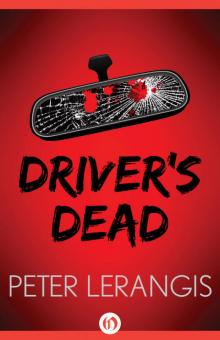 Driver's Dead
Driver's Dead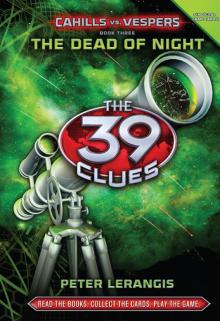 The Dead of Night
The Dead of Night The Promise
The Promise The Yearbook
The Yearbook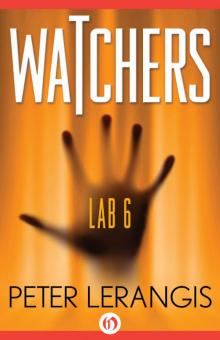 Lab 6
Lab 6 The Tomb of Shadows
The Tomb of Shadows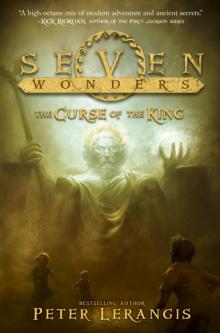 The Curse of the King
The Curse of the King Max Tilt: Fire the Depths
Max Tilt: Fire the Depths The Fall Musical
The Fall Musical The Chaos Loop
The Chaos Loop Island
Island The Sixth Sense
The Sixth Sense Wtf
Wtf War
War Star Trek IV, the Voyage Home
Star Trek IV, the Voyage Home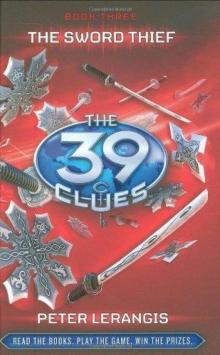 The Sword Thief
The Sword Thief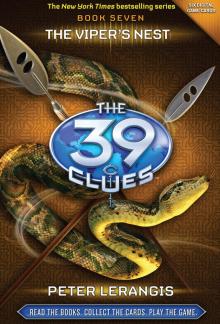 The Viper's Nest
The Viper's Nest The Select
The Select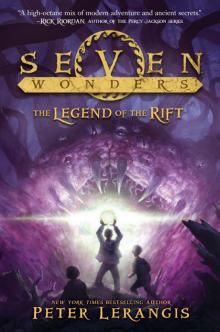 The Legend of the Rift
The Legend of the Rift I.D.
I.D. The Sword Thief - 39 Clues 03
The Sword Thief - 39 Clues 03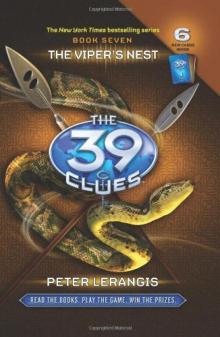 The 39 Clues Book 7: The Viper's Nest
The 39 Clues Book 7: The Viper's Nest Antarctica
Antarctica Seven Wonders Journals: The Select
Seven Wonders Journals: The Select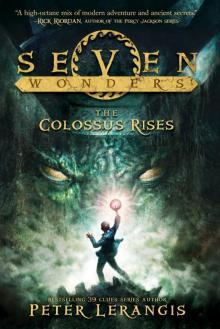 Seven Wonders Book 1: The Colossus Rises
Seven Wonders Book 1: The Colossus Rises Enter the Core
Enter the Core![39 Clues _ Cahills vs. Vespers [03] The Dead of Night Read online](http://i1.bookreadfree.com/i1/04/02/39_clues_cahills_vs_vespers_03_the_dead_of_night_preview.jpg) 39 Clues _ Cahills vs. Vespers [03] The Dead of Night
39 Clues _ Cahills vs. Vespers [03] The Dead of Night Fire the Depths
Fire the Depths 80 Days or Die
80 Days or Die Seven Wonders Book 3
Seven Wonders Book 3